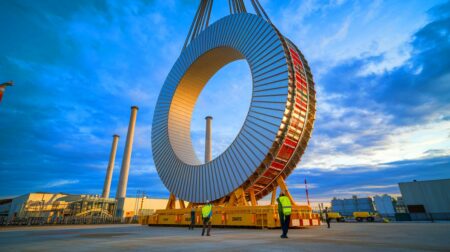| IN A NUTSHELL |
|
The ongoing clash between American and French nuclear giants, Westinghouse Electric Company and Electricité de France (EDF), for a groundbreaking nuclear deal in Slovenia is capturing global attention. This project, known as JEK2, aims to add a new nuclear unit in Krško, Slovenia, a site already crucial to the country’s energy supply. As these two powerhouses vie to secure the contract, Slovenia stands at a crossroads that could redefine its energy landscape. This initiative underscores not just the technological prowess of the contenders but also highlights significant economic and political implications for the region.
The Race to Power Slovenia’s Future
Slovenia is setting the stage for a monumental shift in its energy sector with the proposed JEK2 project. This initiative seeks to construct one or two nuclear reactors with a combined capacity of up to 2,400 megawatts. The current Krško plant, a pivotal energy source, already generates about one-third of Slovenia’s electricity. Managed by GEN energija, this endeavor has drawn bids from Westinghouse and EDF, both renowned for their nuclear technology advancements. The selection of these companies was based on their capability to conduct detailed feasibility studies, estimated at $9 million, covering technical, legislative, and safety requirements. The outcome of this high-stakes competition will determine the future course of Slovenia’s energy independence and sustainability.
GEN energija’s strategic move to enhance nuclear capacity reflects a broader vision of energy self-sufficiency and reduced reliance on fossil fuels. The collaboration with Croatia’s HEP Group on the current Krško facility illustrates a regional approach to energy management. As Slovenia evaluates these two proposals, the decision will significantly influence its long-term energy strategy, potentially setting a benchmark for other nations contemplating nuclear energy expansion.
Economic Benefits and Job Creation
The economic implications of the JEK2 project are profound, promising to bring quality jobs and bolster Slovenia’s energy independence. Dan Lipman, president of Westinghouse Energy Systems, emphasized the transformative potential of the Krško-II project. Westinghouse’s AP1000 reactor, touted as the only operational Generation III+ reactor with fully passive safety systems, represents cutting-edge nuclear technology. Its modular construction design not only enhances safety but also optimizes construction timelines.
EDF’s proposal, featuring its European Pressurized Reactor (EPR) technology, equally presents a robust option. The new plant’s construction would generate thousands of jobs during the build phase, with additional opportunities arising from operational and maintenance roles. The influx of skilled labor and the development of a local supply chain would stimulate Slovenia’s economy. Moreover, the project aligns with Slovenia’s goals for energy security, potentially reducing electricity costs and stabilizing energy prices. The competition between these nuclear giants underscores the strategic importance of the project, with both companies eager to contribute to Slovenia’s economic growth.
Miracle Down Under: Australian Patient Walks Free with Artificial Heart After 100+ Days
Political and Regulatory Challenges
Navigating the political landscape is a critical aspect of the JEK2 project. Slovenia’s plan to hold a referendum on new nuclear developments was shelved amid political controversies. Nevertheless, Prime Minister Robert Golob remains committed to seeking public approval before any final investment decisions are made, with a target decision date set for 2028. This underscores the government’s cautious approach to ensuring public consent and transparency in its energy policies.
The political climate, coupled with stringent regulatory requirements, poses significant challenges. The need to balance environmental concerns, public opinion, and energy needs creates a complex backdrop for decision-making. As Slovenia moves forward, the outcome of the referendum and subsequent regulatory approvals will be pivotal in shaping the project’s trajectory. This political scrutiny reflects a broader global discourse on nuclear energy’s role in achieving sustainable and secure energy futures.
Preparing for a Technological Leap
GEN energija is diligently advancing its preparatory studies, which include comprehensive safety analyses, radiological assessments, and evaluations of seismic and flood risks. These studies are essential to ensuring that the project meets international safety standards and mitigates potential risks. Additionally, GEN energija is exploring the feasibility of small modular reactors, a technology that could further diversify Slovenia’s energy portfolio.
The meticulous planning and evaluation process demonstrates Slovenia’s commitment to leveraging technology for sustainable development. By investing in cutting-edge nuclear technology, the country is poised to enhance its energy infrastructure significantly. This forward-thinking approach not only addresses current energy needs but also positions Slovenia as a leader in nuclear innovation, potentially serving as a model for other countries looking to expand their nuclear capabilities.
The competition between Westinghouse and EDF for Slovenia’s nuclear future is a testament to the transformative potential of nuclear energy. As Slovenia navigates this pivotal moment, the decisions made will have lasting impacts on its energy landscape and economic prosperity. How will Slovenia balance technological innovation, economic growth, and regulatory challenges to secure a sustainable energy future?
Did you like it? 4.5/5 (29)









Wow, $11.8 billion is a huge deal! How will this affect Slovenia’s economy in the long term? 💶
I’m really curious about the public’s opinion on nuclear energy in Slovenia. Will they support the project?
It’s always fascinating to see how international politics play into these deals. Who do you think has the upper hand, France or the U.S.?
Why does it always seem like these mega deals have tons of hurdles? 😅
EDF’s technology sounds promising, but can they deliver on time? 🤔
What are the environmental implications of expanding nuclear power in Slovenia?
Thank you for covering this important topic. Energy independence is crucial for small countries like Slovenia!
Is this project really going to create as many jobs as they claim? Seems too good to be true.
If this goes through, will Slovenia become a leader in nuclear energy tech in Europe?
With a postponed referendum, how likely is it that public approval will be secured by 2028?
The political challenges seem daunting. How does the government plan to overcome them?
I’m skeptical about nuclear energy. Is it really the best solution for Slovenia’s energy needs?
Go France! 🇫🇷 Let’s show the world the power of French technology!
Slovenia is taking a big risk here. Hope it pays off in terms of energy security.
Wow! Really? Westinghouse is a Canadian owned company. No America involved. Get the facts straight first.
Can someone explain what “fully passive safety systems” means in layman’s terms?
Keep us updated on the progress of this project. It’s a game-changer for Europe! 🌍
So, who else thinks this is just a political chess game between the U.S. and France? 🏁
Is there any chance other countries in Europe will follow Slovenia’s lead if this project succeeds?
I’d love to see more about the local impacts, especially on communities near the Krško site.
Great article! Love the detailed breakdown of the economic benefits and challenges.
What’s the timeline for construction if Westinghouse or EDF gets the contract?
I’m glad to see Slovenia considering energy self-sufficiency. Fossil fuels won’t last forever.
Any insights on how this deal affects Slovenia’s relationship with its neighbors? 🤝
How does the cost of this nuclear project compare to renewable alternatives like wind or solar?
Slovenia better prepare for protests. Nuclear energy is always controversial.
Are the safety studies being conducted transparent to the public? Seems like crucial info.
Would love more info on the small modular reactors mentioned. Are they the future?
This sounds like something out of a political thriller! Can’t wait to see how it unfolds.
Why does it feel like Slovenia is stuck between a rock and a hard place? 😅
I’m all for nuclear energy if it means lower energy costs for consumers! 💡
Westinghouse is actually a Canadian company now; owned by Brookfield Asset Management (51%) & Cameco (49%).